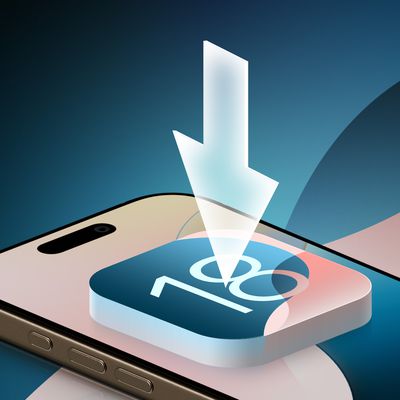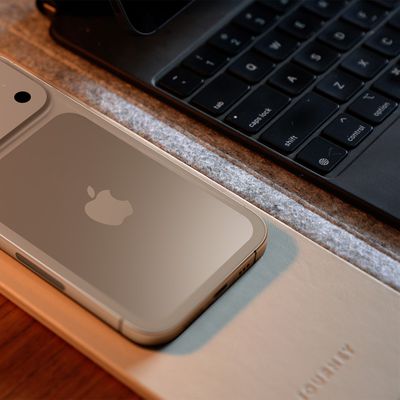Apple today said that it is implementing new features that are designed to make children safer online, including an updated age rating system, a simpler way for parents to set up child accounts, changes to what kids see on the App Store, and a new API that will let developers confirm age range to deliver age appropriate experiences to kids.

The changes are outlined in a new Helping Protect Kids Online white paper [PDF] that is available on Apple's developer site. Apple essentially wants to give parents more control over what their children see and do online in a privacy preserving way, while also heading off less tailored legislation calling for the App Store to be responsible for age verification.
First off, Apple is making it easier for parents and children to set up age appropriate accounts. When creating an account, Apple will ask for the age range of the person using the device, and this feature is in the iOS 18.4 beta. If the account is for a child under the age of 13, there will be a Connect to Family option. A parent will need to provide parental consent for the child to use the App Store and other device features, and this is the process that Apple is simplifying. Right now, Apple asks for a credit card, but going forward, parents will be able to authenticate by using their existing Apple services payment history and confirming with Face ID or Touch ID.
Children can create their own accounts and jump right into using a device if a parent is not available, with automatic age restrictions in place for web content and messages. Some experiences like app downloads will be limited until the child asks the parent to go through the parental consent process to complete account setup. Later this year, parents will be able to correct age ranges for existing child accounts if the current age is inaccurate.
Developers will be required to provide details about whether their apps include user generated content or advertising, require age verification, and/or offer parental controls, with this information to be shared on App Store product pages.
Apple is also updating its age range categories for content. Apple has four categories now (4+, 9+, 12+, and 17+), but is splitting up teen age ranges. The new age categories are 4+, 9+, 13+, 16+, and 18+. Children will not be able to download apps that exceed the age rating that parents have set, and Apple also will not show age restricted apps where apps are advertised in the App Store, instead highlighting age appropriate apps.
- 4+ - The app contains no objectionable content
- 9+ - The app may contain instances of content not suitable for users under 9, including infrequent or mild cartoon or fantasy violence, profanity or crude humor, or mature, suggestive, or horror- or fear-themed content.
- 13+ - The app may contain instances of content not suitable for users under 13, including infrequent or mild medical or treatment-focused content, references to alcohol, tobacco, or drug use, sexual content or nudity, realistic violence, or simulated gambling; or frequent or intense contests, profanity or crude humor, horror or fear-themed content, or cartoon or fantasy violence.
- 16+ - The app may contain instances of content not suitable for users under 16, including through unrestricted web access, frequent or intense mature or suggestive content, or medical or treatment-focused content.
- 18+ - The app may contain instances of content not suitable for users under 18, including through instances of gambling, frequent or intense simulated gambling, references to alcohol, tobacco, or drug use, sexual content or nudity, or realistic violence.
Apple will provide developers with a Declared Age Range API that gives them an age range of a user to ensure that kids don't see content in apps that is meant for adults. The age range prevents apps from having access to specific information about children, such as their date of birth, and parents can choose whether to share age range information with developers. Apple says that its aim is to collect the minimum amount of data to deliver what users need, and it does not want to collect date of birth at the App Store level because all users would need to hand over that information regardless of whether they want to use an age limited app.
While only a fraction of apps on the App Store may require age verification, all users would have to hand over their sensitive personally identifying information to us--regardless of whether they actually want to use one of these limited set of apps. That means giving us data like a driver's license, passport, or national identification number (such as a Social Security number), even if we don't need it. And because many kids in the U.S. don't have government-issued IDs, parents in the U.S. will have to provide even more sensitive documentation just to allow their child to access apps meant for children. That's not in the interest of user safety or privacy.
According to Apple, the approach that it is adopting puts parents in control over what is shared with developers and what children see rather than establishing an umbrella experience for all users.
The App Store changes that Apple is implementing come as several U.S. states are considering more rigorous child protection laws that would require app store operators to confirm user age and obtain parental consent before allowing minors to download apps. Facebook and Instagram owner Meta is also pushing for age verification at the platform level, because then Meta would not need to do it. There are some social media-related laws that require sites to get parental consent at sign up, but nothing universal. Other countries like the UK and Australia have also implemented laws that make social media companies responsible for ensuring children do not access inappropriate content.
Apple has opposed the platform-level legislation in the U.S. because of the privacy issues that are raised when sharing user age with every app, but the API and the age range information could satisfy demand for better age determination practices while also preserving user safety. Apple plans to implement all of these updates this year, but exact timing is not yet available.


















